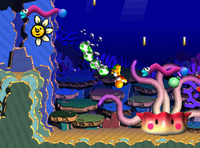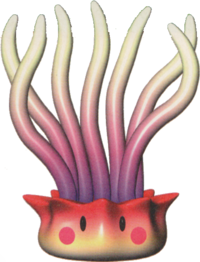Sea Anemone: Difference between revisions
From the Super Mario Wiki, the Mario encyclopedia
Jump to navigationJump to search
m (Text replacement - "<references/> {{" to "<references/> {{") |
No edit summary Tags: Mobile edit Visual edit |
||
| Line 7: | Line 7: | ||
|Jap=イソズキンちゃん<ref>[[Media:Yoshi Story Shogakukan P7.jpg|「ヨッシーストーリー 任天堂公式ガイドブック」 (''Yoshi's Story Nintendo Kōshiki Guidebook''), page 7.]]</ref> | |Jap=イソズキンちゃん<ref>[[Media:Yoshi Story Shogakukan P7.jpg|「ヨッシーストーリー 任天堂公式ガイドブック」 (''Yoshi's Story Nintendo Kōshiki Guidebook''), page 7.]]</ref> | ||
|JapR=Isozukinchan | |JapR=Isozukinchan | ||
|JapM= | |JapM=Pun on 「イソギンチャク」(isoginchaku, sea anemone) and perhaps 「赤ずきんちゃん」(akazukin chan, Little red riding hood).}} | ||
==Reference== | ==Reference== | ||
Revision as of 21:04, March 26, 2021

A large Sea Anemone guarding some coins

Artwork of a Sea Anemone from Yoshi's Story
Sea Anemones[1], also described as giant octopuses[2], are sea creatures with long, stinging tentacles that appear in Yoshi's Story. They are only found in the level "Lots O'Fish". Sea Anemones are invincible and cannot be defeated. They act as stationary obstacles, moving their tentacles back and forth in an attempt to snare prey. Some Sea Anemones have the ability to move their arms in and out. They normally guard melons and coins, which Yoshi must snag with his tongue to avoid the tentacles.
Names in other languages
| Language | Name | Meaning | Notes |
|---|---|---|---|
| Japanese | イソズキンちゃん[3] Isozukinchan |
Pun on 「イソギンチャク」(isoginchaku, sea anemone) and perhaps 「赤ずきんちゃん」(akazukin chan, Little red riding hood). |
Reference
- ^ Yoshi's Story official website (Wayback Archive). Retrieved December 20, 2015.
- ^ Prima Bath. Ultimate Nintendo 64 Pocket Power Guide, 1999 Edition Prima's Official Strategy Guide. Page 90. "Swimming on to the right, past the giant octopus, a blue pipe takes Yoshi to a mini melon game."
- ^ 「ヨッシーストーリー 任天堂公式ガイドブック」 (Yoshi's Story Nintendo Kōshiki Guidebook), page 7.